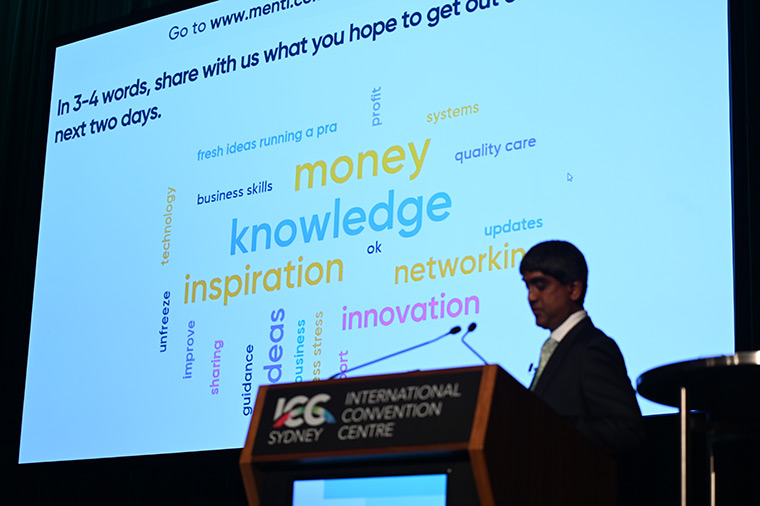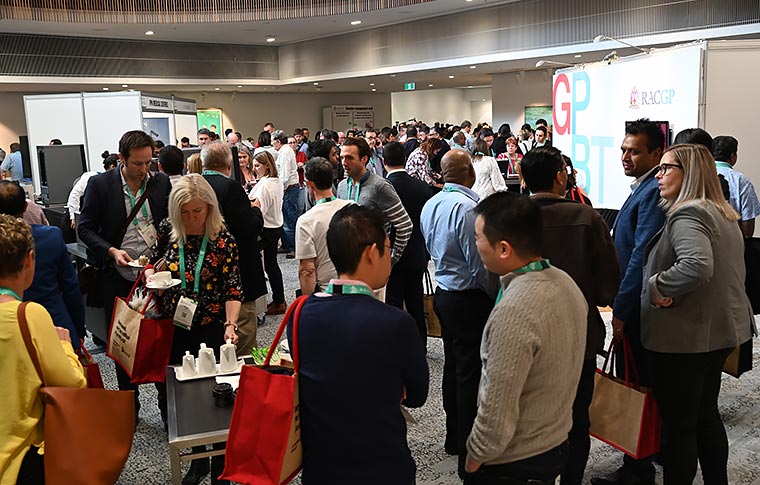News
Knowledge and community: RACGP Practice Owners Conference
Hundreds of GPs and practice managers came together in Sydney for the RACGP’s second conference for current and future practice owners.
 Dr Louise Schaper was keynote speaker at the 2019 RACGP Practice Owner's Conference.
Dr Louise Schaper was keynote speaker at the 2019 RACGP Practice Owner's Conference.
‘Knowledge, inspiration, ideas, motivation.’
These were some of the words that appeared on the screen during the RACGP Practice Owners Conference opening address, as conference convenor Dr Prakash Appanna turned to watch.
The words were being transmitted from a live poll being taken via the conference app, in response to the request, ‘name three things you are hoping to gain from the conference this weekend’.
‘Seeing the results on the screen hopefully lets you know that you are not alone,’ Dr Appanna told the audience.
‘One of the key purposes of this conference is to create a community, a place where we can come together, share our successes, our challenges, and learn from each other.
‘Learning from the journeys of others can be both fulfilling and inspiring.’
Knowledge and community were the clear backbone of the conference, as 750 GPs and practice managers gathered at Sydney’s International Convention Centre to learn from 28 speakers, as well as each other, over the weekend.

Attendees share what they are hoping to gain from the conference through a live poll on the conference app.
The future of healthcare
Keynote speaker Dr Louise Schaper, Chief Executive of the Health Informatics Society of Australia (HISA), followed Dr Appanna with her talk, ‘Everyone likes innovation, no one likes change – how to prepare for the digital disruption tsunami’.
Dr Schaper described a healthcare future focused on the digitisation and democratisation of information and the effects this may have on how GPs and other healthcare providers do business.
‘We should not be passive recipients of change, we should be the architects of our own destiny,’ she said.
Dr Schaper discussed the plans of mega-companies such as Apple, Amazon and Alphabet to enter the healthcare space with informatics, communication technologies and artificial intelligence, advising that providers who do not engage with these changes are likely to go the way of the ill-fated Blockbuster video chain.
She also made it clear, however, that while channels and tools for healthcare delivery will change, the role of the GP will remain integral.
‘You’re all going to be the frontline of care no matter what happens,’ Dr Schaper said.
Dr Schaper’s address was followed by a panel in which she, RACGP President Dr Harry Nespolon, Chief Executive of the Health and Life accounting firm David Dahm, and Chair of the Australian General Practice Alliance Dr John Deery discussed future challenges posed by technological disruption.
Panellists were enthusiastic about the possibilities presented by technological developments, with Mr Dahm pointing out that GPs can reduce their back-office costs by up to 40%.
‘Doctors will be able to work at a higher level now, that's the benefit,’ he said.
Dr Deery also observed that technology had reduced the amount of paperwork he had to complete.
'It's all the work you don't like, the drudge stuff,' he said. 'A lot of the things that annoy you can be really simplified.'
Dr Nespolon was also enthusiastic about technological development and optimistic about its benefits for general practice, emphasising that GPs retain a strong advantage: trust from patients.
‘Trust is key, and people still want to talk to other people,’ he said.
Medicare Benefits Schedule
The next sessions focused on the Medicare Benefits Schedule (MBS), with Adjunct Professor Steve Hambleton and Professor Bruce Robinson from the MBS Review Taskforce (the Taskforce) explaining the progress of the review and the General Practice and Primary Care Clinical Committee Stage 1 and Stage 2 recommendations.
Dr Harry Rothenfluh from the Department of Health then gave a presentation on the MBS shared debt recovery review, explaining how it will work from its implementation on 1 July.
Both presentations were followed by robust question-and-answer sessions, during which GPs and practice owners expressed their concerns with the MBS processes.
Professor Robinson acknowledged the frustrations of the general practice profession, agreeing that GPs are undervalued within the healthcare system. However, he also highlighted that the MBS – which hadn’t received a comprehensive review for 30 years – needed tightening, and that he was pleased the review was being led by people from the medical profession.
‘If we don’t fix it, the Government will come in and fix it itself – and it won’t be to our liking,’ he said.
Professor Robinson also explained that the Taskforce had resisted pressure from consumer groups who wanted to bypass GPs altogether in access to specialists.
‘GPs have to remain at the centre of the Australian healthcare system,’ he said, receiving strong applause when he further stated that remuneration discrepancies between GPs and specialists needed fixing.
Adjunct Professor Hambleton also mentioned the current RACGP consultation on its updated draft White Paper – Vision for general practice and a sustainable healthcare system and urged all GPs to provide their input by undertaking the survey.

GPs and practice managers network and explore stalls in the Exhibitor Hall.
Education and networking
Later sessions focused on issues relating to the business of general practice, including talks from specialists in the areas of accounting, law and IT about how to review the business side of a practice, structure contracts between practice owners and GPs, and keeping patient information safe – and how to handle it when there is a breach.
The first day of the conference closed with a networking reception, during which GPs and practice managers could catch up with old friends or make new ones.
The second day provided more hands-on, practical information, with sessions on making better business decisions when thinking about the future of a practice, establishing the right practice culture, marketing your practice, and how to best manage a team.
These were followed by sessions for GP practice owners, aspiring practice owners and practice managers, featuring advice from industry professionals and hard-won lessons from GPs who have undergone the ownership process themselves, in various models.
Attendees reconvened in the main presentation hall after lunch to learn more about Medicare, where they attended a talk from Dr Robert Menz about demystifying the system and received advice from Shannon Murphy, a Director at ML Private Clients about minimising the risk of a Medicare audit.
Attendee experiences
With 750 attendees, the 2019 conference was much larger than last year’s.
Associate Professor Charlotte Hespe, a GP practice owner and Chair of the RACGP Board and RACGP NSW&ACT, believes this reflects a strong appetite among GPs for greater information and support in the area of running a business.
‘There’s a big need out there,’ she told newsGP. ‘You speak to other practice owners and there’s never really an opportunity to actually talk about what it looks like [to be an owner].
‘There’s a lot of us out here struggling with the Medicare freeze, struggling with all these changes in policy … in order to deliver the best patient-focused primary care, we need to support the practice owners.’
Dr Peter Ng, a GP from Melbourne who was attending with his wife, who is a GP practice owner, was back for a second year.
‘It’s been really good, the sort of stuff you don’t learn in medical school. You learn a bit of it when you do your Fellowship, but really not at this level,’ he told newsGP.
Dr Ralphine Wall, also from Melbourne and returning for her second year, appreciated the assistance she had gained from the conference.
‘It was the first time I felt any kind of support as a practice owner, really,’ she told newsGP.
While she found her first year at the conference extremely helpful, Dr Wall felt the second year contained even more information.
Both GPs expressed enthusiasm about attending the 2020 conference next year, which will be held in Brisbane on 16–17 May.
newsGP weekly poll
Which of the following areas are you more likely to discuss during a routine consultation?